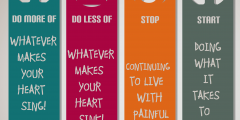
You can tackle Negativity !
As a result of an internal transfer, a client recently took over a new team. But he quickly realised that some of its members had a negative and unhelpful attitude.
This negativity manifested itself in a small clique complaining about customer expectations, some of their working conditions and the amount of work that they had to do (for which they believed that they got little thanks).
Although my client knew that he couldn’t let the situation continue, he felt that he didn’t have much of a lever with which to tackle it because, not only was the work being done, but fellow colleagues seemed to have a fairly neutral stance towards the others’ negativity. It seemed to have become the cultural norm.
Negativity is a badly acquired habit
Unfortunately, negativity can become an insidious habit within organisations. If such behaviour falls short of misconduct or appears not to have a detrimental effect on outcomes, however, it can seem easier to simply let it go.
Many teams that show a mixture of positivity and negativity muddle along without too much drama. Unfortunately though, even though performance may not appear to be hit, habitual negativity will inevitably prevent them from reaching standards of excellence or exceeding goals and targets.
For this reason, if you want your team to be outstanding, you need to tackle the negativity issue and, paradoxically, introduce a change of focus. Here are some tips for how to it:
- Pay attention to negativity, but only with a view to moving the attention towards positivity
- Don’t take the complaints personally
- Be kind and don’t react to negativity with negativity – it simply perpetuates the habit
- Remember that complaining is simply a form of , but you can teach people to communicate in more empowering ways
- Talk to complainers on a regular basis and challenge their negative views. Do this on a one-to-one basis, if possible, as it is far more effective that way
- Describe the impact that negativity has on the rest of the team
- Help complainers re-frame how they communicate their dissatisfaction
- Where possible, help complainers to get what they want, but also show them possible means of communicating that will get better results
- Be clear about the consequences of unacceptable negativity, which amounts to either attacking other people or having a detrimental impact on performance.
If you simply focus on the negativity, quite often the focus as with most things creates more of it. You have to be able to swivel the focus from negativity to any positives, and there always are some. Here are some ideas about how you can make sure the attention returns to the positive.
There are tactics you can use to replace negativity with positivity:
- Reward positive behaviour and communication
- Tell positive stories
- Celebrate success regularly
- Start meetings with positives. Be prepared to bring out the negatives, but ensure that you move back to the positives, ending with an upbeat summary
- Set challenging targets and objectives that bring out the best in the team
- Help the team to connect emotionally to its purpose and meaning and ensure that you get positive buy-in
- Treat others on an adult-to-adult basis – and remember that negative complaining is a sign of immaturity.




Some simply seem to enjoy complaining and being negative. It makes you wonder, what’s the pay off for them?
Thanks for commenting Dan. I think there is always a pay off for any chosen response. It’s simply important I think to keep the dialogue going and help people to express themselves in authentic but constructive ways where possible. I can’t but help agree with you though that some people are happier when they are complaining. I think though this is a defence mechanism designed to hide their need for appreciation and feeling like they matter. What do you think?